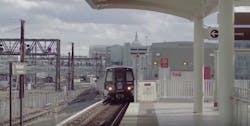DC: Metrorail Reliability Improving as Old Railcars Removed
Half as many trains were offloaded in the first three months of 2017 as compared to the same period in 2016, Washington Metropolitan Area Transit Authority (Metro) announced. The significant improvement in customer reliability was the result of the ongoing, accelerated retirement of all 1000- and 4000-series railcars, Metro's oldest and least reliable, respectively, combined with a "get well" maintenance program on the transit authority's other railcars to make them more reliable.
In the first three months of the year, a total of 218 trains were offloaded (a rate of 2.4 offloads per day), as compared to 433 offloads during the same period in 2016. Metro's "mean distance between delays," a metric that tracks how far a railcar travels, on average, before encountering a problem that delays a train, improved nearly 70 percent — from 48,064 miles between delays in the first quarter of 2016 to 81,451 miles in the first quarter of 2017. Specifically, propulsion-related delays were down 39 percent and door problems were down 16 percent during the period.
Metro GM/CEO Paul J. Wiedefeld has directed that all 1000-series and 4000-series cars be retired by the end of the year as new, more reliable 7000-series cars are delivered. To date, 70 percent of 1000-series cars and nearly half of 4000-series cars have been permanently removed from service.
Today, there are 39 7000-series trains in service, representing about a third of all trains during rush hour.
"These are all signs that Metro is starting to get 'back to good,'" said Wiedefeld. "Once we complete the yearlong SafeTrack program in June, customers will notice their commutes are more predictable — and more likely to be on time."
The improvement in railcar reliability is already resulting in more predictable, on-time trips for customers. Metro has implemented an industry-first method of measuring on-time performance that is based on the actual customer experience, tracking travel times from the moment a customer taps into the system to the moment they tap out. So far this month, Metro customers have arrived within five minutes of their expected arrival time about 90 percent of the time, even with SafeTrack maintenance in effect.



